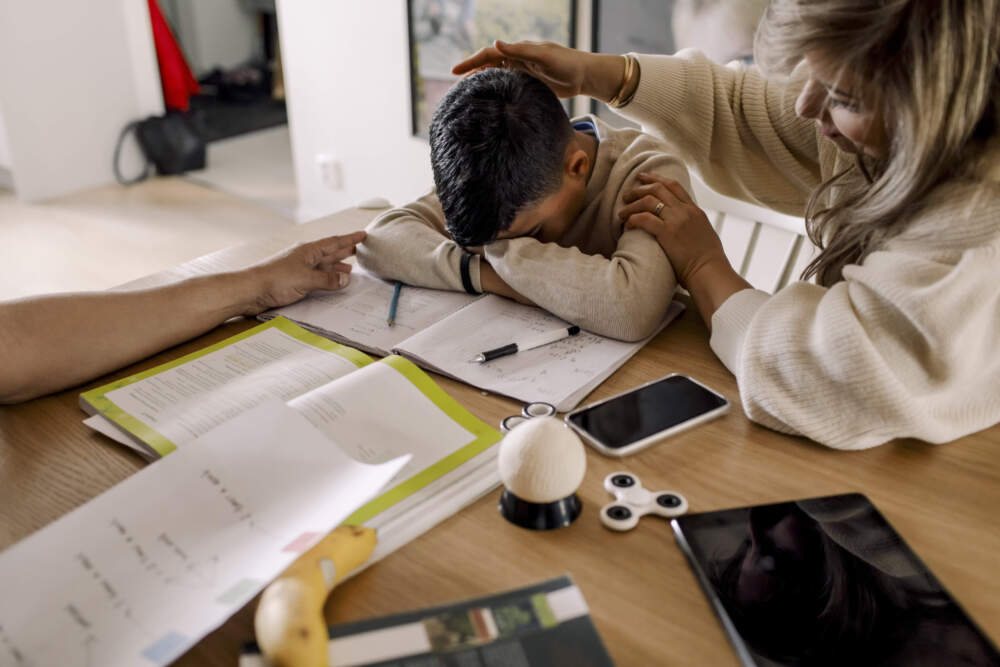Learn more about our mental health series here.
More and more children are facing serious mental health problems in life after the pandemic. Sometimes parents struggle to know if their child is just a typical hormonal teenager struggling to become an adult, or if they are dealing with something more serious.
But research shows that to help their children, parents and carers need to look at themselves and their own mental health.
It’s normal for teenagers to feel stressed, but depression and anxiety disorders have distinct symptoms, says Richard Weisbord, faculty director of the Making Caring Common Project at Harvard’s Graduate School of Education.
“When kids are depressed, they often don’t eat well. They don’t sleep well. They withdraw from social activities,” he says. “They can be really moody and really irritable in a way that’s very different from normal moodiness and irritability.”
Weissbourd’s research with Making Caring Common examines the relationship between parent and teen mental health. In December 2022, he and his team conducted two national studies—one of teenagers and young adults, and another of parents and caregivers—that showed parents and teens suffer from anxiety and depression at roughly equal rates. Young adults fare almost twice as badly as teenagers.
“We would be just as right to raise the alarm about a parent or caregiver’s mental health crisis than about a teenager’s mental health crisis,” says Weisbord. “So we worry about a lot of things that can go wrong when both the parent and the teen are anxious and depressed, and we’re trying to move things in a direction where parents and teens can actually be helpful in these situations .”
4 questions with Richard Weissbourd
How are the mental health of parents and children related?
“For parents, our well-being is often tied to how well our children are doing. When you’re anxious and depressed, it’s harder to be emotionally available to your teen and to be patient and steady in the way that teens often really need. That’s how these negative cycles can start, and that’s why it’s so important to break these cycles early.”
How can parents better listen to their children?
“I think it’s important for parents to recognize that even when they’re anxious and depressed, they’ve often learned a lot, developed coping strategies, [and] they have something to provide for their children even in these situations. And I think part of it is that parents don’t have the confidence that they can be helpful to their children.
“I also think that parents themselves are often isolated and that when parents are able to maintain strong relationships with their partners, with friends outside of their families – when they have enough support – they are much more likely to be emotionally available to their children and able to listen and relate to their children.”
Should parents talk to their children about their own mental health challenges?
“When you’re depressed, you’re often withdrawn, often moody, suddenly angry in ways that are frightening to the child. And children think there is something wrong with them. And when a parent can say, “This is not for you. It’s something I experience, it can provide a huge relief to a teenager and it can make the world make sense again.
“This does not mean that parents should talk a lot about their depression [or] anxiety and expectation of their children being in a therapeutic role with them. It is important for parents to talk about depression [or] anxiety with their children that they are also conveying that they are coping with doing something about it to get help because it can be frightening for a child to think that a parent’s depression [or] anxiety can get out of hand in some way.
What is causing the rise in mental health problems among children and their parents?
“I think there are a lot of things going on, and they vary by race and culture and class. What happens to affluent kids is really different from what happens to low-income kids in many ways. In many middle and upper class communities, I worry that the pressure to achieve will become so excessive. And when we ask teenagers, we give them a list of things that can have a negative impact on their mental health, the pressure to achieve is number one in terms of the amount of stress.
“We also find that teenagers are lonely and we find that teenagers feel like they don’t have or have no meaning or purpose in their lives. About 30%, or a third, feel they have little or no meaning or purpose in their lives. I think the loss of faith-based, religion-based communities, the less people observe, that’s troubling in a lot of ways. I’m not suggesting that people should suddenly become more religious, but you know… community is really important and the sense of purpose and meaning that religious communities can provide. In religious communities, there are structures for dealing with trauma, grief and loss that can be very important for teenagers. So again I want to say that we should not suddenly become more religious. I mean we have to think about how to reproduce these aspects of religion in secular life.
Samantha Rafelson produced and edited this broadcast interview with Kathryn Welch. Rafelson also adapted it for the web.
This segment aired on April 25, 2024.

